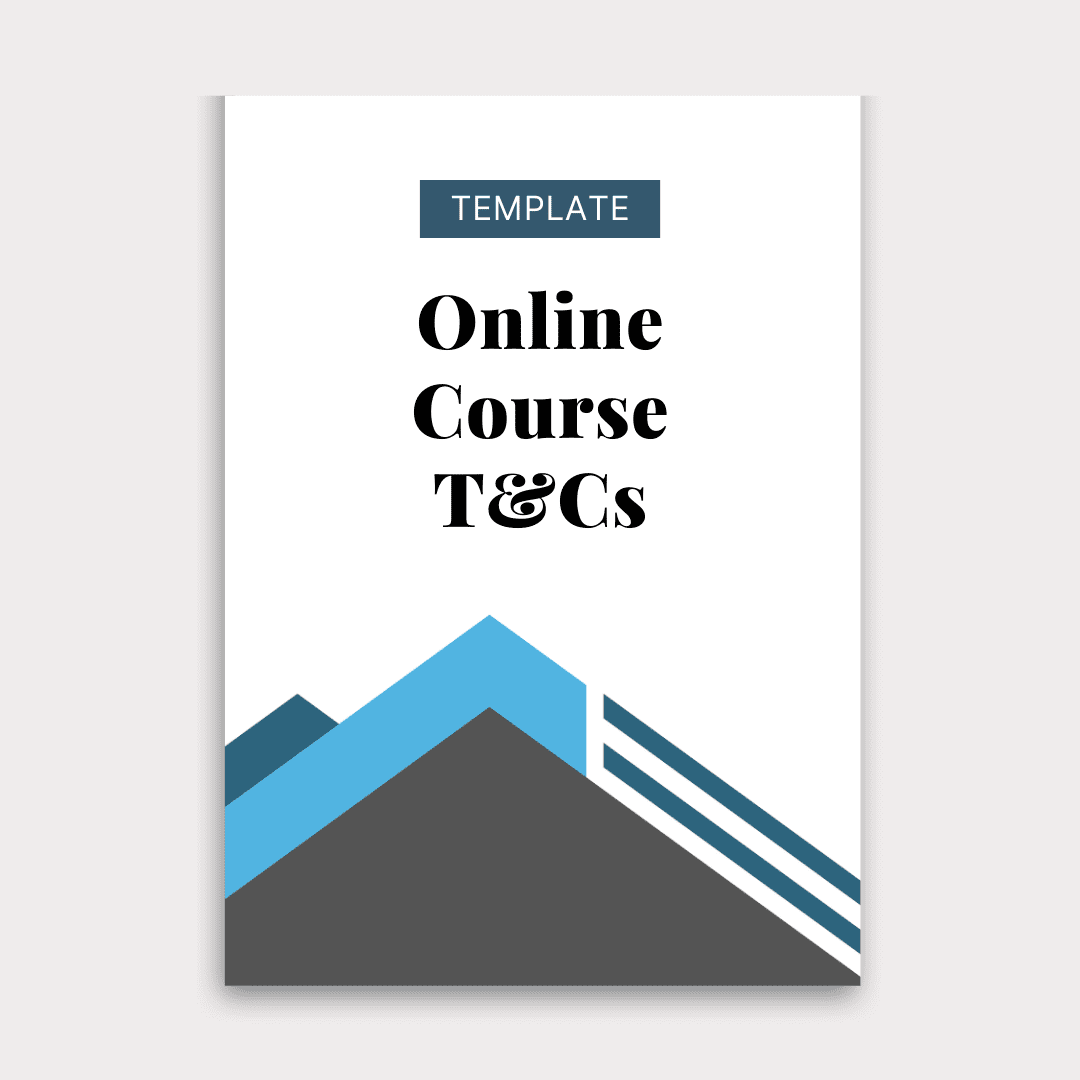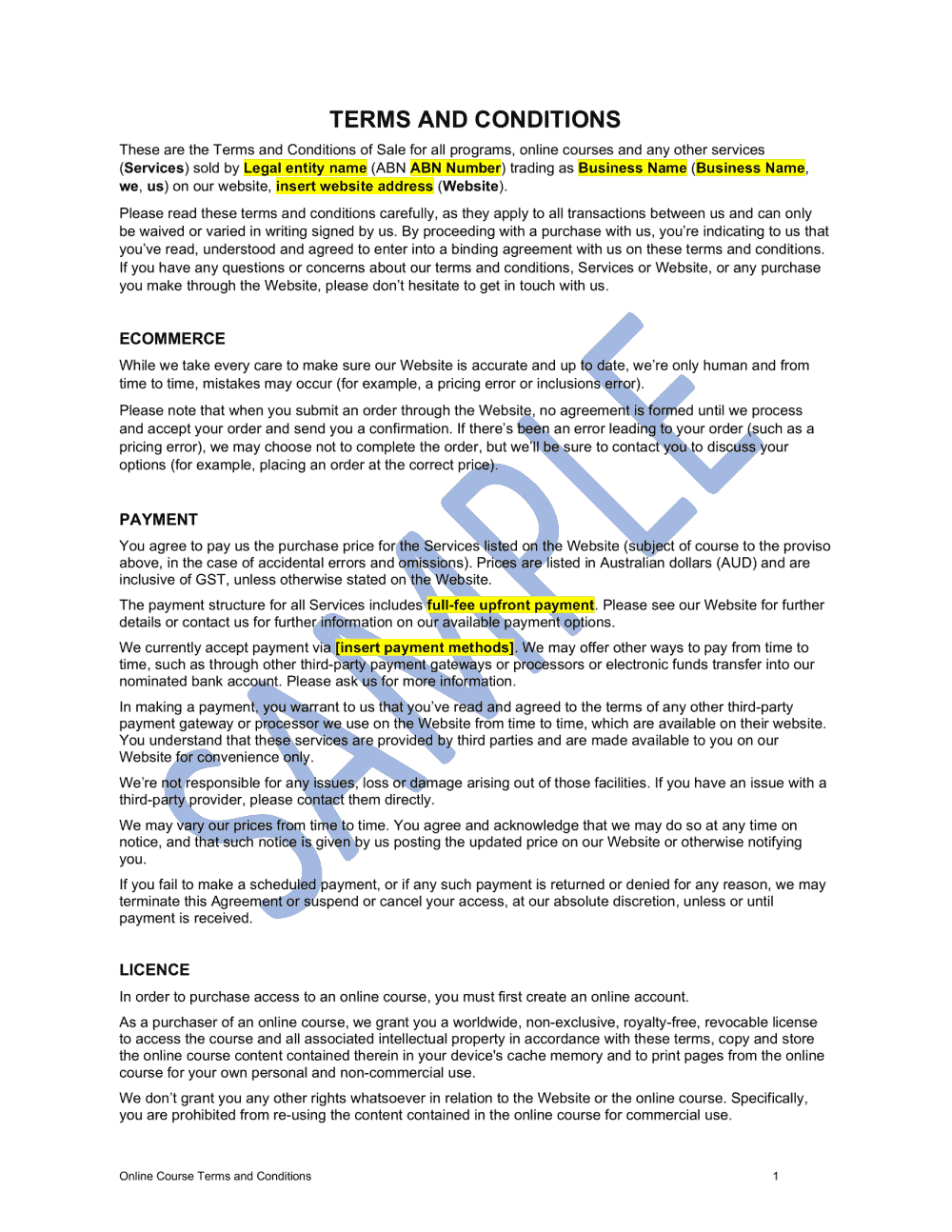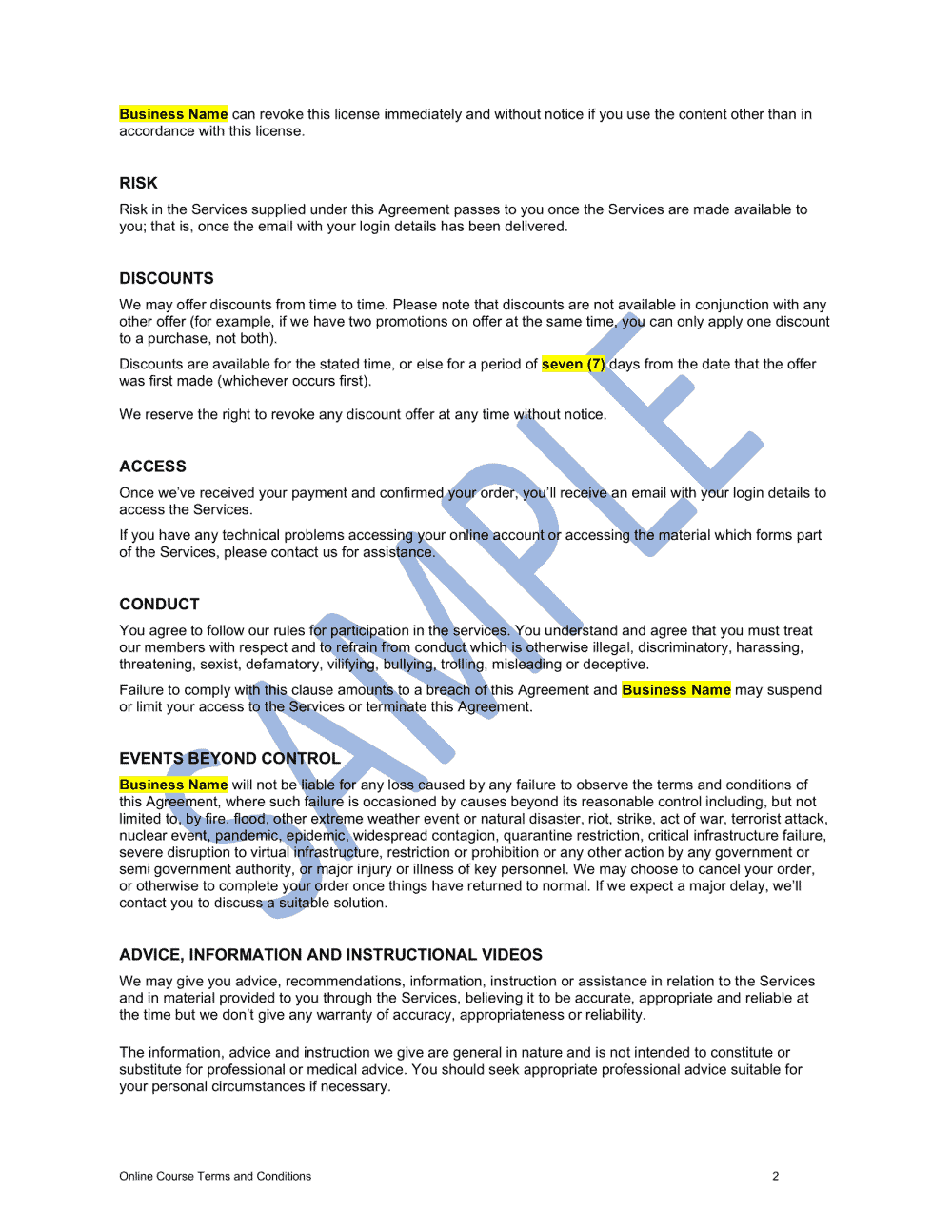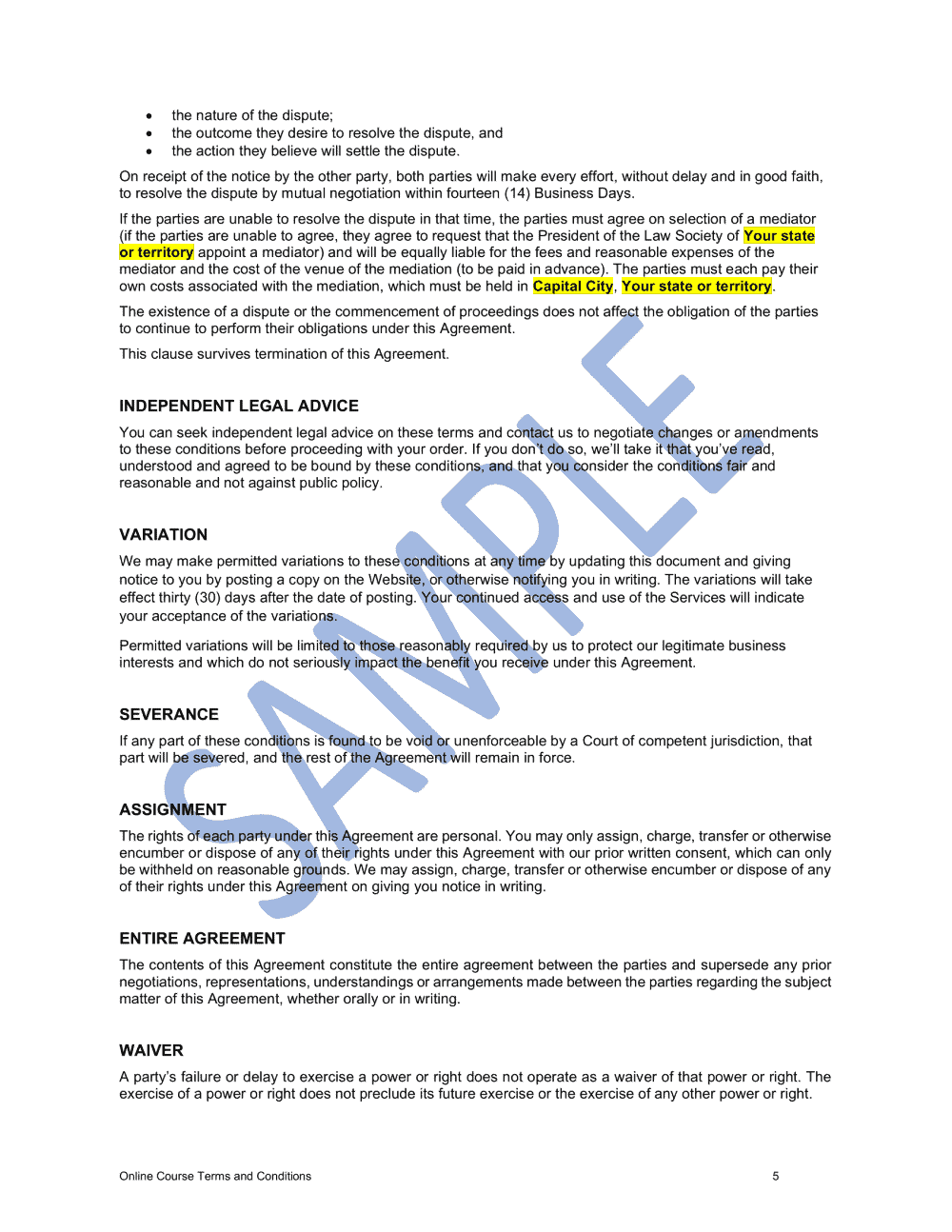Online Course Terms and Conditions
$199.00 inc. GST
- User friendly Word template
- Peace of mind that your business is secure
- Protect your business in minutes, not months
- Legal documents for real people
- Written in plain English by Australian lawyers

- Instant Download
- 90-Day Money Back Guarantee
- Lifetime Access
- Word Document Format
How it Works
Fast and simple legal protection. You'll wonder why you didn't do it sooner.
Get your Template
Go to your Inbox
Peace of mind
We make legal documents for real people
You’re running a business, not a law firm. You want the peace of mind of knowing your business is protected, without spending months, or your life savings doing it. Our lawyers know their stuff. We make affordable, rock-solid legal documents and don’t cut corners.

Sleep well. Act sharp. You’re covered
You’re three clicks away from the peace of mind that comes with knowing your business is protected. No more second-guessing. No more doubts. Run your business with clarity because you have the contract you need when you need it. Feel confident and in control.

Protection for Australian businesses
You’ve Googled the free templates, right? They’re usually “one size fits all”. Our templates are specific to Australian business. And if the law changes, you’ll get a free update. Our templates don’t suck. They give you peace of mind.

What are Online Course Terms and Conditions?
Online Course Terms and Conditions are the terms you set for customers who purchase an online course on your website.
If you’re an educator or industry professional and make an online course for students to purchase and learn from, this contract is for you!
You want to ensure all the hard work you’ve put into your online course isn’t stolen out from under you. You also want to ensure your business practices on refund requests, payment schedule, intellectual property etc., are explained to your students before they purchase.
Who is this template for?
- Course creators
- Coaches
- Creatives
- Can be used on any platform (Kajabi, Teachable, Kartra, Thinkific etc.)
- Suitable for all Australian states and territories
Other names for Online Course Terms and Conditions
- Online Course Agreement
- Online Course Agreement for Students
- Online Course Terms of Use
- Agreement for Purchasing Online Courses
- Agreement for Selling Online Courses
- Internet Course Contract
- Digital Course Agreement
What does this Online Course Terms and Conditions template cover?
Our Online Course Terms and Conditions template includes everything you need:
- Payment – payment schedule, payment methods you accept etc
- Licence – Licence which allows customers to access course materials while you retain ownership
- Discounts – your policy for discounts and coupon codes
- Access – how students can log in and access the course
- Conduct – rules for participation in the course
- Events Beyond Control – to cover events beyond your control (e.g. COVID19, natural disasters)
- Advice and Information – important legal disclaimer
- Linked Websites – explaining you aren’t responsible for content on 3rd party websites
- Australian Consumer Law (ACL) – important legal clause covering consumer rights
- Limitation of Liability – important legal term to protect you
- Cancellation Policy – your policy on cancellations
- Refund Policy – your policy on refunds
- Intellectual Property – to protect your intellectual property rights and ownership of course materials
- Confidentiality – both parties agree to keep confidential information private
- Dispute Resolution – process to deal with disputes if a customer has a complaint or is unhappy
- General – standard contract clauses such as Assignment, Severance, Entire Agreement, Waiver and Governing Law
Australian Consumer Law – what’s required?
Australian Consumer Law requires you to include the following details in your Terms and Conditions:
- A statement that you comply with Australian Consumer Law
- How you will provide a refund, repair or replacement of faulty products
- Details of your guarantee
- Details of any warranty (if you provide one, which is not obligatory)
Remember, you cannot have a blanket “no refunds” policy in your T&Cs. You are required by law to guarantee your goods and services against faults or if they do not perform as advertised.
Where should I publish my Online Course Terms and Conditions?
It is standard practice to display a tickbox linking to your T&Cs in the shopping cart or checkout. Customers must click on the “OK“, “I Agree“, or “I Accept” button before they complete an order. This is known as a clickwrap agreement.
You can also publish your T&Cs on your website as a new page and place a link in the menu or footer together with your Privacy Policy and Website Terms of Use.
Can I have a separate Refund Policy page on my website?
Yes, you can have a separate Refund Policy page on your website. However, it should mirror the terms you include in your Online Course Terms and Conditions. In other words, you should copy what is in your T&Cs and make sure the same information is reflected in your Refund Policy.
If you only had a Refund Policy on your website, a customer could argue that they did not accept the refund policy when they signed up, and are therefore not bound by it.
What if I sell to Australia AND overseas customers?
No worries, you can still cover this in one document. Just ensure you update any relevant sections on payment etc., to include international customers.
Generally, you want the governing law for your legal agreements to be where you are based so that if a dispute arises, you are covered by local laws.
If you sell or market to European customers, you will also need a GDPR Privacy Policy to comply with EU privacy laws.
Course Platforms – Compatibility
There are a number of popular course platforms available, including Udemy, Teachable, Thinkific and Kartra.
Our template can be used with any of these platforms. Normally, just a few quick steps are involved to add your T&Cs to the platform’s backend (see example here).
Why Customers Love our Online Course Terms and Conditions
Read reviews from other happy business owners...
- Reviews
- Questions
Thank you for submitting a review!
Your input is very much appreciated. Share it with your friends so they can enjoy it too!
So easy
Template was exactly what I was looking for and was super easy to use. Took less and 15mins to set up. Totally worth the money in the time it saved me.
Quick and easy
Perfect for what I need it for and very easy to adjust. Also included much more coverage for things I hadn't yet thought about. Nice to have piece of mind prior to launching course
So easy and fuss free
It was an all around easy process, It was also great learning through application as I read my Ts and Cs, I learnt more about business and what boundaries I want to put in place.
Take the stress out of legal documents
Get peace of mind with our Online Course Terms and Conditions today!
Frequently Asked Questions
Got Questions? We've Got the Answers!
All of our templates come in Word format (docx).
We recommend using Microsoft Word on a desktop to fill in the templates.
Our templates are Word documents so they’re editable.
We don’t recommend editing the template outside the highlighted areas. An experienced lawyer wrote your template. If you delete or modify clauses it could affect your protection.
We know you’re a smart cookie, but we highly recommend avoiding the temptation to fiddle.
Yes, you get lifetime access to your template.
You’ve got a contract ready to go whenever you need it in your business.
Definitely!
Change your font, add your logo and even some colour. Present your document in your brand style and delight your clients. You’ll still be legit. You’ll just look amazing-er.
All of our templates come with instructions on the first page.
We also include comments throughout the document to help guide you as you fill out each section.
Yes. All our templates are written by qualified Australian lawyers who hold an Australian legal practicing certificate.
Our co-founder Courtney Bowie is a partner in Sydney law firm, Her Lawyer.
Yes. You can use the templates in all Australian states and territories.
If a law changes, we’ll update your template and send it to you – for free.
No hidden catches here. When you buy a template or bundle you own them for life. The download links never expire.
No recurring fees. No accounts. Just buy what you need. Simple, right?
If you have a question, contact us. We’re always happy to help.
Email: info@easylegaltemplates.com.au
Phone: 1300 490 145
You may also like...
90-Day Money Back Guarantee
We’re so confident you’ll love our products, we offer a no-hassle refund within 90 days of purchase. If you’re not happy for any reason, we’ll work with you to make sure you're happy, even if that means a full refund.







